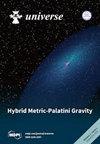贝叶斯知识注入法研究历史太阳黑子数量
IF 2.6
4区 物理与天体物理
Q2 ASTRONOMY & ASTROPHYSICS
引用次数: 0
摘要
提出一个值 Y 来估计目标值 ρ 的科学方法通常会受到一定程度的不确定性影响。在贝叶斯框架中,不确定性水平可以用 68% 区间的宽度来衡量,68% 区间是从后验分布 p(ρ|Y) 中采样的排序 ρ 值的中间 68% 的范围。本文认为贝叶斯知识注入(BKI)可以根据事件 A 发生的额外知识来减少后验分布 p(ρ|Y) 的不确定性。BKI 是通过贝叶斯定理中的条件先验分布 p(ρ|A)来实现的,假设给定真实的 ρ,其误差污染值 Y 与事件 A 无关。我们用两个例子来说明如何研究是否有可能通过使用 BKI 注入额外信息 (A) 来减少年度太阳黑子数 (SSN) (ρ)的 14C 重建 (Y) 的不确定性。发现 SSN 来自有远东肉眼太阳黑子记录的年份这一信息(A)在减少不确定性方面并不那么有效。相比之下,SSN 来自周期最小值年份的信息则非常有效,产生的 68% 间隔要小得多。贝叶斯计算过程中未使用的望远镜观测到的 SSN 子集对得出的 SSN 贝叶斯点估计值(ρ 的后验中值)进行了交叉验证和测试。本文章由计算机程序翻译,如有差异,请以英文原文为准。
Bayesian Knowledge Infusion for Studying Historical Sunspot Numbers
A scientific method that proposes a value Y to estimate a target value ρ is often subject to some level of uncertainty. In the Bayesian framework, the level of uncertainty can be measured by the width of the 68% interval, which is the range of the middle 68% of the ranked ρ values sampled from the posterior distribution p(ρ|Y). This paper considers Bayesian knowledge infusion (BKI) to reduce the uncertainty of the posterior distribution p(ρ|Y) based on additional knowledge that an event A happens. BKI is achieved by using a conditional prior distribution p(ρ|A) in the Bayes theorem, assuming that given the true ρ, its error-contaminated value Y is independent of event A. We use two examples to illustrate how to study whether or not it is possible to reduce uncertainty from 14C reconstruction (Y) of the annual sunspot number (SSN) (ρ) by infusing additional information (A) using BKI. Information (A) that SSN is from a year that has a Far Eastern record of naked eye sunspots is found to be not so effective in reducing the uncertainty. In contrast, information that SSN is from a year at a cycle minimum is found to be very effective, producing much narrower 68% intervals. The resulting Bayesian point estimates of SSN (the posterior medians of ρ) are cross-validated and tested on a subset of telescopically observed SSNs that were unused in the process of Bayes computation.
求助全文
通过发布文献求助,成功后即可免费获取论文全文。
去求助
来源期刊

Universe
Physics and Astronomy-General Physics and Astronomy
CiteScore
4.30
自引率
17.20%
发文量
562
审稿时长
24.38 days
期刊介绍:
Universe (ISSN 2218-1997) is an international peer-reviewed open access journal focused on fundamental principles in physics. It publishes reviews, research papers, communications, conference reports and short notes. Our aim is to encourage scientists to publish their research results in as much detail as possible. There is no restriction on the length of the papers.
 求助内容:
求助内容: 应助结果提醒方式:
应助结果提醒方式:


